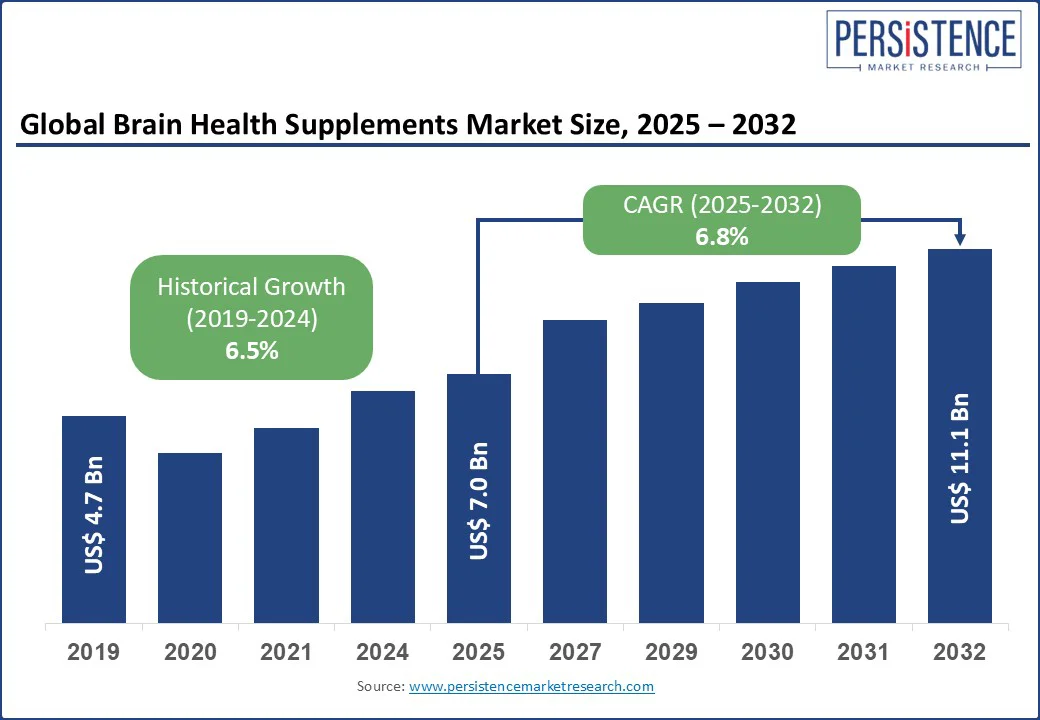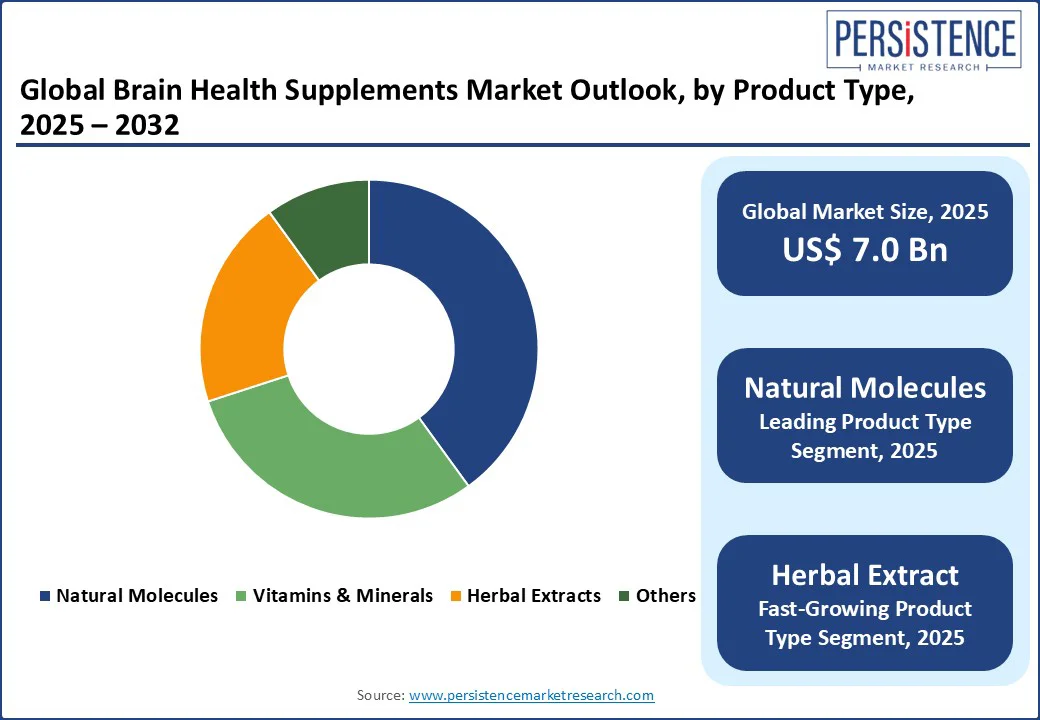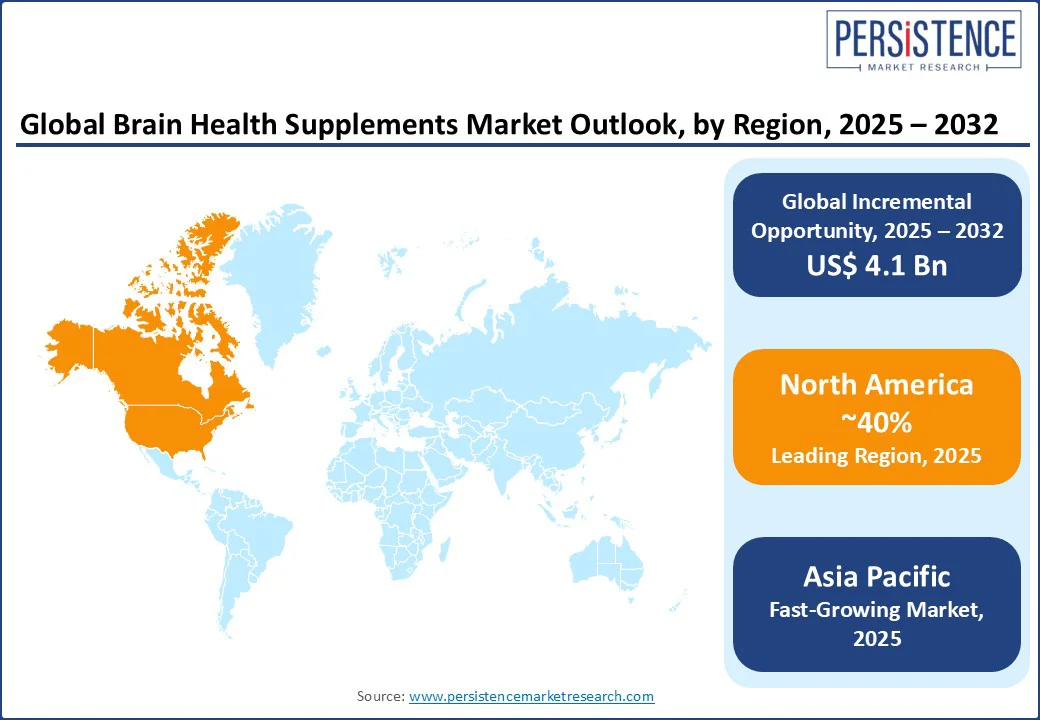ID: PMRREP5888| 177 Pages | 19 Aug 2025 | Format: PDF, Excel, PPT* | Healthcare

The global brain health supplements market size is projected to rise from US$ 7.0 Bn in 2025 to US$ 11.1 Bn by 2032. It is anticipated to witness a CAGR of 6.8% during the forecast period from 2025 to 2032.
The brain health supplements industry has witnessed steady growth in recent years, driven by rising consumer awareness of cognitive health and the increasing prevalence of mental health challenges. Key players are innovating with bioavailable natural molecules, herbal extracts, and fortified vitamin blends to appeal to health-conscious demographics, particularly aging populations and young professionals seeking nootropics and cognitive enhancers.

Key Industry Highlights:
|
Global Market Attribute |
Key Insights |
|
Brain Health Supplements Market Size (2025E) |
US$7.0 Bn |
|
Market Value Forecast (2032F) |
US$11.1 Bn |
|
Projected Growth (CAGR 2025 to 2032) |
6.8% |
|
Historical Market Growth (CAGR 2019 to 2024) |
6.5% |
The growing prevalence of cognitive health issues, such as memory decline, mental fatigue, and reduced concentration, is a significant driver for the brain health supplements market. Increasing stress levels, largely attributed to hectic lifestyles, digital overload, and work-related pressures, have heightened the demand for products that support mental clarity, focus, and long-term brain function. As consumers become more health-conscious, there is a rising inclination toward natural nootropics, herbal extracts, and clinically proven ingredients that promote cognitive well-being and resilience against age-related decline.
For instance, according to the World Health Organization (WHO), stress-related disorders are projected to be among the leading causes of global disease burden by 2030. This alarming trend is prompting both preventive and therapeutic measures, driving innovation in brain health supplements. Market players are increasingly focusing on research-backed, safe, and sustainable formulations to meet the growing demand for cognitive performance enhancement.
The brain health supplements market faces significant challenges due to stringent regulatory frameworks and varying approval requirements across regions. In markets such as the U.S. and EU, products must comply with guidelines from bodies such as the U.S. Food and Drug Administration (FDA) and the European Food Safety Authority (EFSA), which often require extensive scientific evidence to validate safety and efficacy claims. These regulatory complexities can delay product launches, increase compliance costs, and limit market entry for smaller players.
Additionally, consumer skepticism remains a barrier, fueled by past instances of exaggerated claims and a lack of transparent labeling in the supplement industry. Many consumers demand clinical proof and third-party certifications before trusting brain health products. This growing demand for credibility compels manufacturers to invest in rigorous testing, quality assurance, and educational marketing to overcome doubts and build long-term consumer trust in cognitive health solutions.
The brain health supplements market is poised for growth through the rising adoption of personalized nutrition, where supplement formulations are tailored to an individual’s genetic profile, lifestyle, and specific cognitive health needs. Advances in AI-driven health assessments, microbiome testing, and wearable technology are enabling brands to create targeted nootropic solutions that maximize efficacy and consumer satisfaction. This personalized approach not only enhances user trust but also promotes brand loyalty, setting a competitive edge in the evolving market.
Furthermore, emerging markets in the Asia Pacific, Latin America, and the Middle East present significant untapped potential. Rising disposable incomes, urbanization, and growing awareness of mental wellness are fueling demand for high-quality brain health products. With a younger, tech-savvy population and increasing exposure to global health trends, these regions offer lucrative opportunities for companies to expand their footprint through localized marketing strategies, affordable product lines, and culturally relevant cognitive health solutions.
In 2025, natural molecules hold the largest share of the brain health supplements market, accounting for around 40%. Their dominance is driven by the proven efficacy of compounds such as omega-3 fatty acids, phosphatidylserine, citicoline, and acetyl-L-carnitine in enhancing memory, focus, and overall cognitive performance. Backed by strong clinical research and endorsements from healthcare professionals, these ingredients are widely adopted in both preventive and therapeutic brain health regimens.
Their established credibility and inclusion in premium supplement brands make them the go-to choice for consumers seeking scientifically validated cognitive support solutions.
Herbal extracts are projected to be the fastest-growing product type. The increasing global preference for plant-based, clean-label, and traditional remedies fuels this growth.
Ingredients such as ginkgo biloba, ashwagandha, bacopa monnieri, and lion’s mane mushroom are gaining traction for their neuroprotective and adaptogenic properties. The surge in herbal nootropic demand is also supported by the wellness industry’s focus on holistic mental health solutions, sustainable sourcing, and reduced side effects compared to synthetic alternatives.
Memory enhancement leads the application segment, holding 30% market share in 2025. This dominance is linked to the rising global aging population, increasing prevalence of Alzheimer’s disease, and heightened awareness of early intervention for cognitive decline. Supplements targeting memory use clinically backed ingredients such as DHA, phosphatidylserine, and huperzine A, which are trusted for long-term brain health. Growing adoption among students, working professionals, and older adults further solidifies this segment’s leading position in the brain health supplements market.
Stress & anxiety management is expected to be the fastest-growing application segment. The rise is fueled by escalating work-life pressures, digital burnout, and pandemic-induced mental health challenges. Brain health supplements in this category often feature adaptogens such as ashwagandha and Rhodiola rosea, along with L-theanine, which help regulate cortisol levels and promote relaxation without sedation. Increasing acceptance of mental wellness products in mainstream health routines is accelerating segment growth.
Drug stores & retail pharmacies account for 45% market share in 2025, making them the leading distribution channel for brain health supplements. Consumers prefer these outlets for professional guidance, product authenticity, and immediate availability. The segment benefits from strategic product placements, in-store promotions, and trusted pharmacist recommendations, especially for clinically validated cognitive health supplements. Established retail pharmacy chains further boost accessibility and visibility for top supplement brands.
The online channel is the fastest-growing channel. E-commerce platforms, brand-owned websites, and subscription services are driving this surge, supported by targeted digital marketing, AI-based personalization, and direct-to-consumer convenience. The growth is further amplified by the increasing popularity of telehealth consultations and influencer-driven product endorsements, making online platforms a preferred choice for tech-savvy and health-conscious consumers seeking brain health supplements.

The North American brain health supplements market dominates globally, accounting for approximately 40% share in 2025, driven by high consumer awareness, advanced healthcare infrastructure, and rising prevalence of cognitive health concerns. Increasing cases of Alzheimer’s, dementia, and age-related memory decline are fueling demand for clinically proven natural molecules and herbal nootropics.
The U.S. leads the region, supported by strong regulatory oversight, extensive product availability, and investments in mental wellness programs. The growing adoption of personalized nutrition, combined with e-commerce expansion and subscription-based supplement models, continues to boost market growth. North America remains a key hub for innovation in brain health supplements.
Europe brain health supplements market commands a significant share of the global industry, fueled by a rapidly aging population and increasing focus on cognitive health and mental wellness. Key markets such as Germany, the U.K., and France drive demand for memory enhancement supplements, stress relief supplements, and sleep support formulas.
Strict EFSA regulations ensure safety and efficacy, enhancing consumer trust in brain health products. Rising adoption of herbal nootropics and plant-based formulations, combined with government-backed initiatives for dementia and Alzheimer’s prevention, is boosting market growth. Expanding e-commerce channels and premium product innovations further strengthen Europe’s brain health supplements market outlook.
The Asia Pacific brain health supplements market is the fastest-growing globally, projected to register the highest CAGR from 2025 to 2032. Rapid urbanization, rising disposable incomes, and growing awareness of mental wellness are driving strong demand for memory enhancement, stress management, and sleep support supplements.
Key markets such as China, Japan, India, and South Korea are witnessing a surge in the adoption of herbal nootropics such as ginkgo biloba, bacopa monnieri, and ashwagandha, supported by traditional medicine practices. Expanding e-commerce platform, increasing health-conscious consumer bases, and government initiatives for cognitive health promotion are accelerating growth in the Asia Pacific brain health supplements market.

The global brain health supplements market is moderately competitive, driven by innovation, acquisitions, and digital marketing strategies. Accelerated Intelligence Inc. leads in nootropic formulations, while Teva Pharmaceutical Industries Ltd. holds a strong position in pharmaceutical-grade brain supplements. Brands such as Onnit Labs Inc. and Quincy Bioscience LLC compete on clinically backed efficacy and consumer trust. Key strategies include product diversification, e-commerce partnerships, and premium offerings with fortified blends, enabling companies to capture growing demand for cognitive health solutions.
The brain health supplements market is projected to reach US$ 7.0 Bn in 2025.
Rising cognitive health concerns and stress-related conditions are key drivers.
The brain health supplements market is poised to witness a CAGR of 6.8% from 2025 to 2032.
Personalized nutrition and expansion in emerging markets are key opportunities.
Accelerated Intelligence Inc., Onnit Labs Inc., and Teva Pharmaceutical Industries Ltd. are key players.
|
Report Attribute |
Details |
|
Historical Data/Actuals |
2019 - 2024 |
|
Forecast Period |
2025 - 2032 |
|
Market Analysis Units |
Value: US$ Bn/Mn, Volume: As Applicable |
|
Geographical Coverage |
|
|
Segmental Coverage |
|
|
Competitive Analysis |
|
|
Report Highlights |
|
|
Customization and Pricing |
Available upon request |
By Product Type
By Application Type
By Distribution Channel
By Region
Delivery Timelines
For more information on this report and its delivery timelines please get in touch with our sales team.
About Author